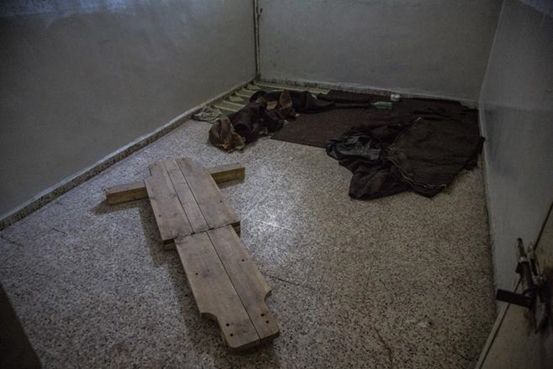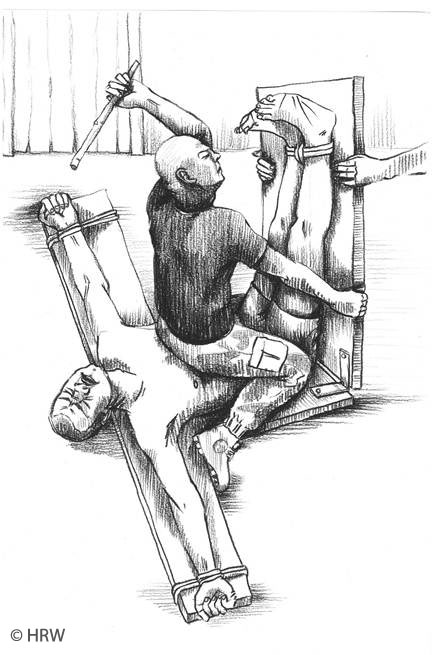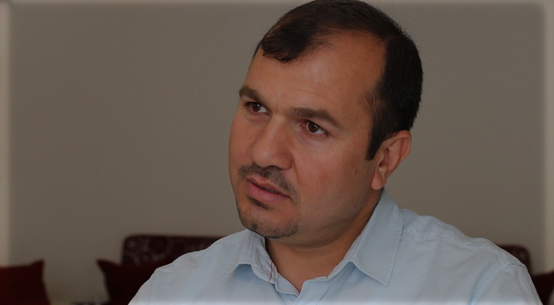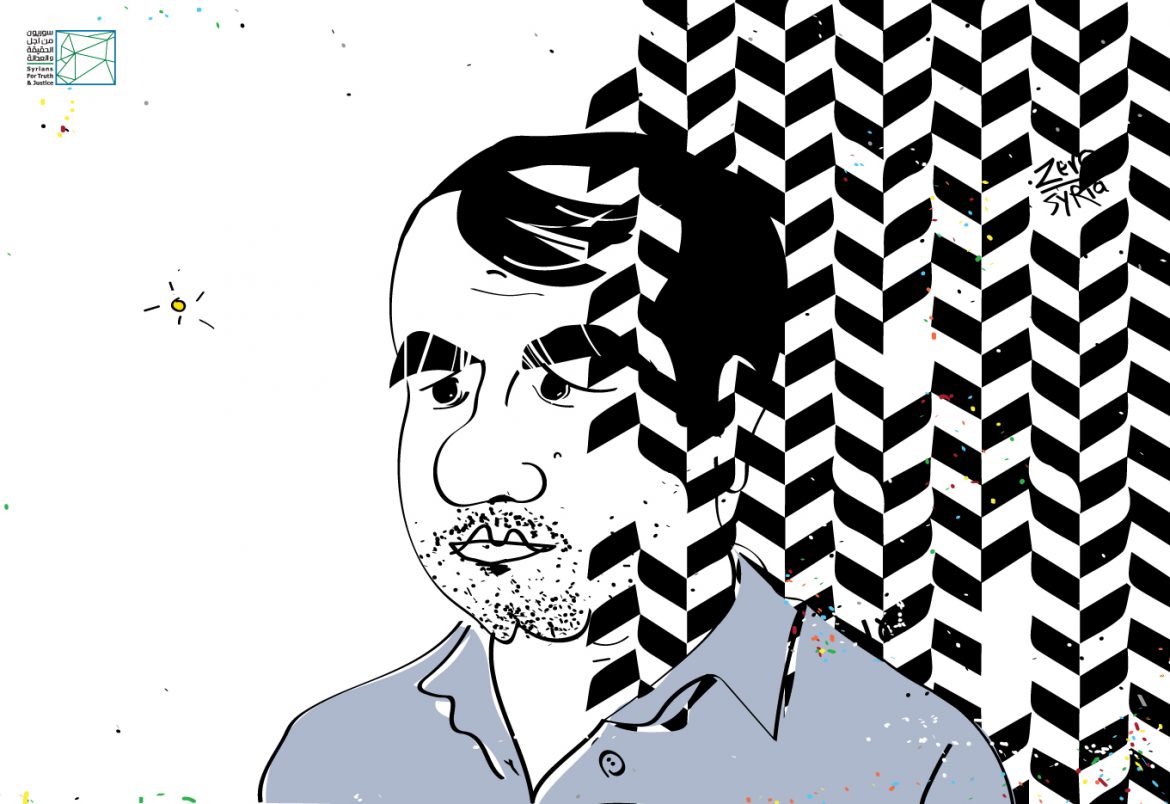Introduction: Journalist Kamal Sheikho is from al-Hasakah governorate, al-Dirbasiya city, which is the furthest northern point of Syria to be more specific. Born in 1979, he moved to Damascus in 2005 to be a student in the university. He studied in the Faculty of Letters, Sociology Department. He also volunteered as an activist defending human rights in Syria.
He started his career as a journalist in the summer of 2006. He was detained twice before the Syrian revolution due to his civil activities and his work as a journalist. He was also subject to several "security summons" as well as a travel ban in 2007. Ultimately, he was stripped of his civil and political rights.
His first detention was in early 2007 and resulted from his running a website called Tharwa [Fortune], which was banned in Syria at the time. his detention lasted for a week.
"It was my first time in solitary confinement," says Kamal. "Although I had read about it and heard dozens of stories from friends who had experienced it under Assad the father, and later the son, it was my first personal experience."
Kamal was detained for the second time on 23 June 2010 at the Syrian-Lebanese border. He spent nine months in custody; three months in the Political Security Apparatus (City Branch), 45 days in Branch 285 operated by the General Intelligence Directorate (State Security), and the rest of his detention in Adra Central Prison in Damascus.
Kamal was referred to the military investigative judge, the first individual Judge, who is known for receiving files of "political opposition members." He was then referred to Adra prison, where he spent 9 months. Two months after his detention, the conviction was issued, in accordance with article 286 and 307 of the penal code, for "weakening the nation’s morale and diluting national sentiment".
On 8 February, 2011, Kamal went on a hunger strike to protest his arbitrary detention without trial. He spent 24 days without food. No one cared about his demands, however, so he stopped drinking water as well on the 25th day of his hunger strike. 48 hours later, it was decided to release him on bail, guaranteed by his residence statement to be tried as a free person outside prison; that was on 14 March, 2011.
Kamal explains the reason for this detention:
"The basic charge was interviewing members of the Syrian opposition inside and outside Syria. At that time, I used to write for All For Syria publication. However, I am pretty sure that the direct reason behind my arrest, according to interrogation sessions inside security branches, was my interview with the Syrian opposition member, Dr. Aref Dalila, after he was released from Syrian detention centers at the end of 2009. My interview with him was in May 2010, and it seems that the authorities put my name on all border crossings after that date."
Speaking of his impressions during his detention, Kamal says:
"From my point of view, I see prison as a "term". During my detention period, I felt that I, as a person, was in touch with this term and this place at the same time. In this detention place, four walls and a ceiling, a detainee starts to deeply question the essence of existence and the importance of defending and upholding principles they believe in. What aggravates your agony of detention is to know that you are imprisoned for working in public affairs, for having your own political views and attitudes that are against the ruling authority and for your writings that expose and defend the oppressed. The only thing that made me feel I was still alive during my detention was the voices and the movement outside, whether it was the movement of guards when they brought food or when they let me use the toilet for a short time.
Torturing others, on the other hand, made me feel terrified at times, but made me feel more adhering to my causes at others. Those moments were equal to years in prison. Each moment in prison can’t be measured by any period of time. Prison is really the place of true challenge for one's ideas, whether he will choose to go on upholding these ideas and to keep working hard in persistence for them or to turn into a new personal life away from such activities of opposition and resistance to the oppressive authority. Ironically, the answer to those questions always came after being released. My decision without any hesitation was always to complete what the first oppositionists have started and to follow their footsteps."
Kamal and the Syrian revolution:
Released on 14 March, 2011, Kamal Sheikho accidently met a group of revolutionary activists on 15 March, 2011 who were preparing a sit-in in front of the Ministry of Interior demanding the release of all political detainees.
According to Kamal, "the sit-in of the Ministry of Interior" had only one humanitarian demand, "releasing all political prisoners". It was a time-limited sit-in (from 12:00 pm to 1:00 pm). They were planning to send a delegation to meet the Minister and hand him a message demanding their release.
However, the statement included a political demand as well, as it called for ending the state of emergency and dissolving the Supreme State Security Court and extraordinary courts, among other principles which the Syrian opposition was calling for at the time. The number of people in that sit-in was between 250 to 300 people, most of whom were well-known activists in the political and legal circles in Syria in addition to families of detained Syrian opposition members.
Kamal describes what happened that day stating:
"Minutes before the sit-in of 16 March, 2011, dozens of police and intelligence men, dressed in their military uniform (riot police) and civilian clothes, attacked us. They dispersed the sit-in brutally. We had 15 injuries that day as a result of direct beating and more than 100 participants, including me, got arrested. This was my third detention. We were referred to one of the Military Security branches. (I think it was "Patrols Branch".) We were 35 activists (males and females). We spent one night there, and the next day, we were referred to the civil court and then to Adra central prison, where I spent two months before getting released. I was the last one to be released among that group."
Kamal was arrested for the fourth time during a demonstration in Midan area in Damascus, but it was just for several hours. Later on, he got arrested for the fifth time after a demonstration in the Rukn Eddin area in August 2011, when he was attacked by personnel, who turned out to be "municipality workers", who beat him up severely.
"I don't have a good memory of those moments, from the first minutes of getting arrested to the arrival at the police station at Rukn Eddin and then to the Security Branch (Political Security), because of the severe beating during arrest," says Kamal. "They had security members among them and they used clubs to beat us and to disperse the demonstration.
I stayed in the branch for 3 days before getting released. We were subject to unexpectedly severe beatings to the extent that some of us were referred to hospitals upon reaching the branch because of the big wounds and bruises people had. Personally, it took me more than ten days to heal from the wounds and marks of the torture and beating."
Kamal was arrested for the sixth time for 48 hours in the Espionage Branch, which is affiliated with State security, after a friend, who was wanted and hiding, asked him to go to his place and fetch him his bags as he was planning to travel abroad. When he entered the house, he was surprised by security members attacking him. They didn't stop beating him until they discovered he wasn't the person they wanted.
The seventh detention and criminal security:
The detention period during which Kamal was subject to the worst torture was in the summer of 2011, when he was arrested on 27th of June by the so-called "public committees," the had spread into the neighborhood where Kamal used to live. One of his neighbors reported him saying that an "opposition journalist" lived in the neighborhood and was involved in "suspicious activities". They took him to the main checkpoint created by a militia of the neighborhood residences calling themselves "popular committees".
Kamal describes what happened next stating:
"When I reached the checkpoint, one of the members took my ID and checked it against his database, which is linked to the main security apparatuses in Syria (Air force, military, General and political intelligence departments). He didn't find any evidence against me, but he noticed that I had a travel ban and several detentions. He asked another member to search the "criminal security" database and discovered that I had "an old ten-day sentence" due to a quarrel between me and an officer in Adra central prison after he "crossed the limits" with me and called me a traitor and an agent to hostile countries among other pre-fabricated accusations. So, I hit the table with my hand and, unfortunately, the table was broke and I got referred to the military judiciary.
The officer dropped his "personal right", but there was still the so called "public right". I received a ten-day sentence, but I didn't do the period, so that sentence was still valid.
Later on, the members of the checkpoint handed me to members of the Criminal Security, who kept beating me, all the way from the checkpoint to the criminal security branch in Bab Musalla in the middle of Damascus, until I passed out. When I arrived, they took my personal stuff and personal information and continued beating me with a green pipe, which the prisoners used to call "Lakhdar Brahimi" in mockery of the UN which has failed them. Later on, they put me in a cell with dozens of other prisoners.
The next day, they summoned me for interrogation. They started by torturing me using the so called "Basat al-Reeh" which consists of two moving pieces of wood. They tied me to them in a cross position, then they knocked me to the ground, lifted my legs and a tall big guy started hitting me on the sole of my feet so brutally that pain to spread to my pelvis, in particular, and to my whole body, in general. At the beginning, I tried to count the number of beatings. I counted ten, but I failed to go on counting because of the severe pain and the increased intensity of beating followed. I passed out.

The torture tool known as Basat al-Reeh. It was found in the State Security Branch in Raqqa Province in Syria, late April, 2013. Photo Credit: Bryan Denton ©HRW 2013
One of the "detainees" in this branch was helping the jailor hold my feet to continue the process of beating. When they finished, he told me that they hit me more than 60 times. He was surprised by my endurance. For three days after this, I couldn't walk on my feet at all because they were swollen and bleeding. However, old prisoners advised me to move my feet regardless of the pain in order to prevent any possible inflammation or ulceration that many other prisoners had experienced. It was the first time I was subject to this type of torture. Three days later, they tortured me again using the same "Basat al-reeh" method.
The second time they tortured me with “Basat al-reeh” was very similar to the first one. They didn’t ask about anything or any incident. They just started beating me. I don't remember what happened next. All I remember is other detainees trying to wake me up by spraying water on my body. They asked me to stand up and move to prevent blood retention in my foot. Four days after this torture session, they summoned me again for interrogation. They put me the same way on “Basat al-reeh” piece of wood. Before they started the beating process, they asked me to say all I know. At that moment, I knew that my interrogation had actually begun.

Image Credit: Basat al-reeh © hrw
The number of prisoners in my cell, a room 3 meters wide and 4 meters long, fluctuated daily between 70 and 100 detainees. There wasn't enough space to sit or sleep. There was a 50-year-old person from Qalamoun area. They used the same torture method, Basat al-reeh, with him. When he came back to the room, his feet had open wounds due to the whipping with cables and whips. Because he couldn't endure the severe torture, they referred him to the hospital that day and brought him back the next day. And because he couldn't endure the pain and due to his swollen feet and blood retention, he died in front of us less than two hours after he arrived.
It was a strange feeling to see a person die in front of you as a result of torture while you can't do anything or offer any help. This incident made all of us feel that we are all virtually dead because of torture or psychological tension.
I stayed in this place between 27 June 2013 and 25 July 2013. I got released by the military court after combining the period I spent in detention at the Criminal Security with the default judgment period I was arrested for.”

Kamal Sheikho
Click here to watch a short video about Kamal’s story,

